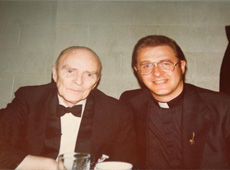The Quiet Heroes of Civil Rights Dr Conn and Patricia McCluskey
Posted By: August 14, 2018
Brid Rodgers.Irish News. Belfast. Tuesday, August 14, 2018.
In the years following partition, Catholics in Northern Ireland suffered widespread discrimination, particularly in the areas of jobs and housing.
Decades of intermittent, IRA violence and republican rhetoric from nationalist politicians in The South at election times strengthened the siege mentality of unionism confirming their position of “what we have, we hold.”
Meantime, the ruling Unionist government at Stormont presented all claims of discrimination as mere Republican propaganda. The British government turned a blind eye. Nationalists felt trapped.
Into this hopeless situation stepped two people with a social conscience, a burning desire to see justice done and a deep and extraordinary commitment to that goal.
It was the heartbreaking experiences of young homeless families revealed to [Doctor] Conn McCLUSKEY in his daily surgery and on his rounds, that brought Conn and his wife Patricia to the conclusion that something had to be done. Out of this, the Homeless Citizens League was formed, led by Angela McCrystal and Patricia McCluskey.
The very first-—if rarely acknowledged-—protest march of the civil rights movement, organized by the Homeless Citizens League, took place in Dungannon in June 1963.
Yet the [Dungannon] Council refused to budge. It was put about that the protesters were a bunch of rabble-rousers. A group of homeless young women pushing prams and led by the smartly dressed wife of the local doctor – an unlikely group of rabble-rousers!
Two months later, a squat by 17 families in an estate of prefabs due for demolition by the council led to the arrival of Press and TV cameras, forcing the hand of the Housing Minister and resulted in the agreement to complete a new housing estate for the squatters.
What a dramatic demonstration of the power of dignified peaceful protest! A small group of local women in Dungannon, dogged and determined, had taken on the Unionist controlled Council and won.
Yes, change was possible after all.
All this was happening at a time when the Unionist party, backed up by a partisan police force and the B Specials, was in full control in Stormont while the British Government continued to shirk its sovereign responsibility for the situation in Northern Ireland.
Despite the ‘David and Goliath’ challenge ahead of them, the McCluskeys realized that more had to be done. They set up the Campaign for Social Justice.
In the words of the late journalist, Patsy McCooey, this development was “the single most important one in the genesis of the Civil Rights Movement.”
The press release at their first press conference in the Wellington Park Hotel in January 1964 stated:
“The Government of Northern Ireland’s policies of apartheid and discrimination have continued to be implemented at all levels with such zeal that we have banded ourselves together to oppose them…Our first objective will be to collect comprehensive and accurate data on all injustices done against all creeds and political opinions, including details of discrimination in jobs and houses and to bring them to the attention of as many socially minded people as possible.”
And so began the hard, grinding work of the Campaign. The world of Conn and Patricia McCluskey was turned upside down. They were threatened and slandered, even cajoled by surrogates of Unionist politicians.
They supported Fr Denis Faul in exposing the biased nature of the courts; the unavailability of legal aid to those seeking to expose discrimination was highlighted in a leaflet outlining their own experience with British Prime Ministers.
They never wavered. Their home in Dungannon became the headquarters of the Campaign. All of this while Conn ran a busy practice and on many occasions had reason to fear for his life as he travelled the country roads at night responding to emergency calls.
The facts of discrimination along with outrageous statements by unionist politicians were meticulously collated and dispatched in the first and second editions of “The Plain Truth” and in newsletters distributed nationally and internationally from Washington to London and further afield where influence could be brought to bear, and, indeed, shame reflected on the British Government and Unionists.
For the first time, there was incontrovertible and incontestable evidence of blatant discrimination against the Nationalist community.
Their motivation was summed up by Patricia speaking to a rally in Manchester organized by the Campaign for Democracy in Ulster in November 1966. “There are thousands of fine Protestants whose emotions have been so worked upon that they are a frightened people. We want to change all that. We want to live with our Protestant neighbours as equals, as fellow Christians and as fellow Irishmen and women,” she said.
It is appropriate that on this, the 50th anniversary of the Civil Rights Movement, we should applaud and acknowledge the courage, the commitment and the foresight of two extraordinary people.
Many of the younger generation may not realize that in some measure they owe the status of equality that they now take for granted to the sacrifices of a general practitioner in Dungannon and his wife. For, in the hopeless and dark world of second-class citizenship inhabited by their grandparents, Conn and Patricia McCluskey lit a candle, which grew into a mighty flame.
The original Committee of the Campaign for Social Justice was as follows:
Peter Gormley, ear, nose and throat surgeon and Conor Gilligan, general surgeon, both in the Mater Hospital; Maurice Byrne, dentist in Dungannon; Hugh Mc Conville, teacher, Lurgan; J.J. Donnelly, Councillor, Enniskillen; Tom McLaughlin, wealthy businessman from Armagh; Leo Sullivan, science professor, Omagh; Olive Scott; Maura Mullally and Patricia McCluskey ( Chairperson)










